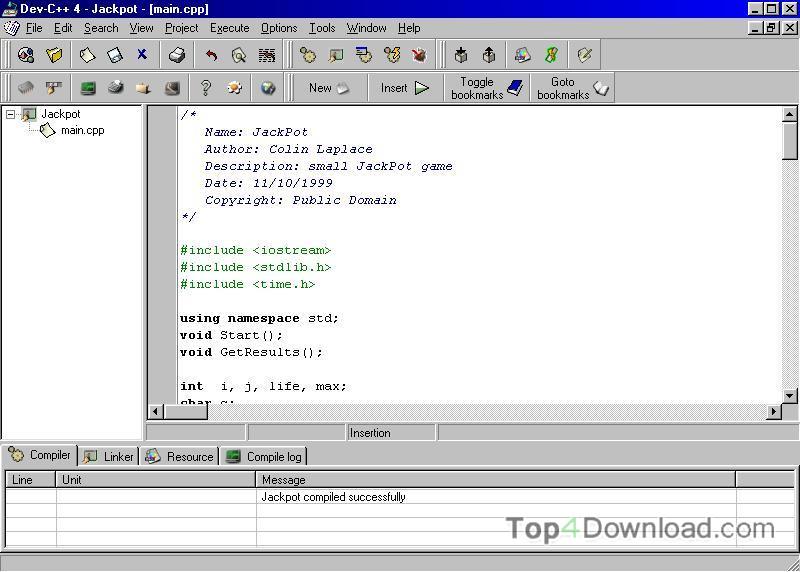Resource File Dev C++
Jan 15, 2011 188 videos Play all C Qt Programming VoidRealms JAVA - How To Design Login And Register Form In Java Netbeans - Duration: 44:14. 1BestCsharp blog 3,709,602 views. Here is some code from Dev-C that uses a resource file I dug up from a few years back. I just rebuilt the project as C (it was C) and it works. The code also has a menu in it where you can go to the File menu & choose Open and the Open File Dialog Box will present itself. On the Help menu a dialog box from a resource file (.rc) is created. Resource Files (C) Since projects in.NET programming languages do not use resource script files, you must open your resources from Solution Explorer. Use the Image editor and the Binary editor to work with resource files in managed projects. Any managed resources you want to edit must be linked resources.
-->Thanks for the very useful list of resources to learn about the C and C. Because It is a basic level of the computer language to know about the advanced language. It is really very helpful to. DEV-C is a fully-featured integrated development environment (IDE) for creating, debugging and creating applications written in a popular C programming language. Even though tools for the development of C software have undergone countless upgrades over the years, a large number of developers located all around the world have expressed a wish to continue using DEV-C. I used to program in VC6 in past.Now I turn to Dev-cpp,I find it is good to use.Because I was new learner in Dev-cpp,when I want to do Windows program,my problem occur-the resource file is not in graph as in VC6.So is there a tutorial about the resource file program in Dev-cpp?
We recommended that you embed the manifest of your application or library inside the final binary because this guarantees correct runtime behavior in most scenarios. By default, Visual Studio tries to embed the manifest when it builds a project. For more information, see Manifest Generation in Visual Studio. However, if you build your application by using nmake, you have to make some changes to the makefile. This section shows how to change the makefiles so that it automatically embeds the manifest inside the final binary.
Two approaches
There are two ways to embed the manifest inside an application or library.
If you are not doing an incremental build you can directly embed the manifest using a command line similar to the following as a post-build step:
or
Use 1 for an EXE and 2 for a DLL.
If you are doing an incremental build, use the following steps:
Link the binary to generate the MyApp.exe.manifest file.
Convert the manifest to a resource file.
Re-link (incrementally) to embed the manifest resource into the binary.
The following examples show how to change makefiles to incorporate both techniques.
Makefiles (Before)
Consider the nmake script for MyApp.exe, a simple application built from one file:
If this script is run unchanged with Visual Studio, it successfully creates MyApp.exe. It also creates the external manifest file MyApp.exe.manifest, for use by the operating system to load dependent assemblies at runtime.
The nmake script for MyLibrary.dll looks very similar:
Makefiles (After)
To build with embedded manifests you have to make four small changes to the original makefiles. For the MyApp.exe makefile:
For the MyLibrary.dll makefile:
The makefiles now include two files that do the real work, makefile.inc and makefile.targ.inc.
Create makefile.inc and copy the following into it:
Now create makefile.targ.inc and copy the following into it:
See also
Feature list
Dev C++ Download And Install
- Support GCC-based compilers
- Integrated debugging (using GDB)
- Support for multiple languages (localization)
- Class Browser
- Code Completion
- Debug variable Browser
- Project Manager
- Customizable syntax highlighting editor
- Quickly create Windows, console, static libraries and DLLs
- Support of templates for creating your own project types
- Makefile creation
- Edit and compile Resource files
- Tool Manager
- Print support
- Find and replace facilities
- Package manager, for easy installation of add-on libraries
- CVS Support
- To-Do List
- CPU Window

Requirements
|
License
Dev-C++ is Free Software distributed under the GNU General Public License.
This means you are free to distribute and modify Dev-C++, unlike most Windows software! Be sure the read the license.

Donations
Please support Dev-C++ by making a donation ! The money will be shared between the active developers and the support manager in order to help us continue improving Dev-C++ from day to day.
Click on the button below to make a donation using Paypal or your Credit Card :
Downloads
| Dev-C++ 5.0 beta 9.2 (4.9.9.2) (9.0 MB) with Mingw/GCC 3.4.2 Dev-C++ version 4.9.9.2, includes full Mingw compiler system with GCC 3.4.2 and GDB 5.2.1 See NEWS.txt for changes in this release. Download from: |
| Dev-C++ 5.0 beta 9.2 (4.9.9.2), executable only (2.4 MB) Dev-C++ version 4.9.9.2, without Mingw compiler system and GDB. Get this one if you already have a previous Dev-C++ beta or already a compiler. See NEWS.txt for changes in this release. Download from: |
| Dev-C++ 5.0 beta 9.2 (4.9.9.2), source code (1.6 MB) Dev-C++ version 4.9.9.2 source code for Delphi. Download from: |

Dev-C++ 4
Yes, Dev-C++ 4 is still available. There are the downloads:
Binaries:
Source code:
Resource File Dev C Download
Developers information
The SourceForge project page is located here. The bleeding edge source code is located at the SourceForge CVS.
Dev C++ Programs
- Source code for Dev-C++ 5: CVS repository
In order to compile it, you'll need Borland Delphi 6. - Mingw source code:http://www.mingw.org/